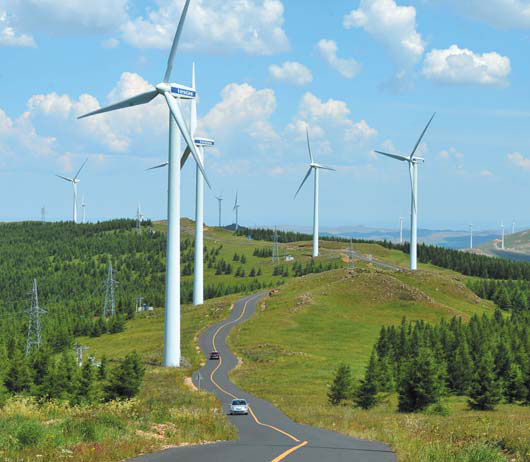Economy strives for quality environment
Volvo's auto engine manufacturing factory in Zhangjiakou produced 10,000 engines by the end of April.
The factory is the only engine workshop out of Sweden set up by the world famous automaker.
The company selected Zhangjiakou because of its comparatively clean air, which is needed for the precise and strict manufacturing process.
"Developing in an environmentally friendly way could make Zhangjiakou a new model city in China. A good environment in Zhangjiakou benefits not only Beijing, but more importantly the people living in the region," said Xing Guohui, Party chief of Zhangjiakou.
The city escapes the worst of Beijing's pollution as it is upwind and in the upper reach of the capital's water system. The central government has been very prudent in choosing the development model for the small city north of Beijing.
The average per capita GDP of Beijing is about four times that of Zhangjiakou.
To protect the air amid a national smog crisis, Zhangjiakou had closed all coal markets by the end of last year.
The shutdown cooled other relevant industries including restaurants, transport, auto repairs and real estate.
In the past three years the region also closed two iron and steel factories, a cement factory and a beer brewery to reduce the negative influence on the environment.
Investors and factory owners wanted to move their polluting industries and projects to Zhangjiakou from Beijing and Tianjin to take advantage of cheap labor, rich energy resources and convenient transport after the central government decided to integrate the development of Beijing, Tianjin and Hebei last year.
The city government turned the investors and factories down. "We are very careful in choosing the right industries to fit with our identity," said Xing, who added that innovative and advanced green industries were the only ones selected.
Zhangjiakou's industrial parks attracted more than 10 high-tech organizations to develop key emerging industries of national importance.
These included China Aerospace Science and Technology Corporation, Tsinghua University, Beijing Normal University and Harbin Institute of Technology.
Several researchers said the good environment attracted them to the city.
"Good ecology is an invaluable asset and we will keep a balance between the booming green industries and ecology," Xing said.
According to the Chinese Academy of Forestry, the forest in Zhangjiakou is worth about 730 billion yuan and its wetland 19 billion yuan.
The ecological benefits Zhangjiakou's forest and wetland bring its neighboring areas each year is worth 30 billion yuan, of which 48 percent is enjoyed by Beijing, according to the academy.
liyang@chinadaily.com.cn
|
Zhangjiakou has developed wind power as a major renewable power resource. |



















